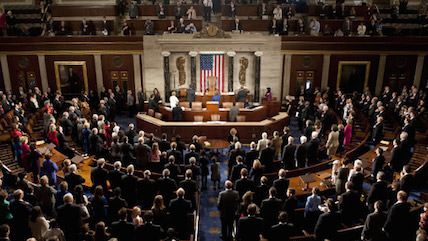Poll: 74 Percent Say Congress Should Prioritize Economic Growth Over Reducing Income Inequality

A recent Reason-Rupe poll finds 74 percent of Americans say they want Congress to prioritize policies that promote economic growth, while 20 percent want Congress to focus on reducing income inequality instead.
Similarly, when asked which economic issue would be most relevant to voters' judgments this November 23 percent said the "gap between rich and poor."
Focus on economic growth is a bi-partisan issue, including 69 percent of Democrats, 73 percent of independents, and 86 percent of Republicans who prioritize promoting economic growth over reducing income inequality.
Nevertheless, these results do not imply that Americans do not care about income inequality, quite the opposite. The Pew Research Center found that 78 percent of Americans think "the gap between rich and poor" is a "big problem" for the country. Moreover, the Public Religion Research Institute found 66 percent of Americans say "government should do more to reduce the gap between rich and poor."
But what do people mean when they say the government should "do more" ? It could mean anything from income redistribution to deregulating industries to allow for more job creation. In fact, when Americans are offered more concrete alternatives, 58 percent of Americans think that private sector growth is a better method that government policy (31%) to reduce income inequality, according to a New Models National Brand Poll.
In sum, Americans care about income inequality and would prefer disparities attenuated. However, when policies intended to reduce income inequality conflict with those intended to promote growth, Americans opt for growth policies.
This implies that policy advocates should either explain why policies intended to reduce income inequality will ultimately come at the expense of economic growth, or alternatively why this would not occur.
Ultimately, if Americans must make a choice, they opt for a more prosperous economically differentiated society over a less prosperous economically egalitarian society.
The Reason-Rupe national telephone poll, executed by Princeton Survey Research Associates International, conducted live interviews with 1000 adults on cell phones (500) and landlines (500) August 6-10, 2014. The poll's margin of error is +/-3.7%. Full poll results can be found here. including poll toplines (pdf) and crosstabs (xls).
Editor's Note: As of February 29, 2024, commenting privileges on reason.com posts are limited to Reason Plus subscribers. Past commenters are grandfathered in for a temporary period. Subscribe here to preserve your ability to comment. Your Reason Plus subscription also gives you an ad-free version of reason.com, along with full access to the digital edition and archives of Reason magazine. We request that comments be civil and on-topic. We do not moderate or assume any responsibility for comments, which are owned by the readers who post them. Comments do not represent the views of reason.com or Reason Foundation. We reserve the right to delete any comment and ban commenters for any reason at any time. Comments may only be edited within 5 minutes of posting. Report abuses.
Please to post comments


"...they opt for a more prosperous economically differentiated society over a less prosperous economically egalitarian society."
And exactly where do you get those are the only two options? Or even that Americans see it that way? To my way of thinking, the polls show that Americans believe reducing income inequality is a priority, and that in fact they see that as a way to PROMOTE economic growth. And in addition, they are not afraid of government initiative to achieve both ends.
That Pew poll you cite also shows that most Americans believe that two of the things that could be done in order to achieve that equality is to create higher taxes on the richest among us, and to raise the minimum wage.
I think it would be more accurate to conclude that Americans understand private sector growth is the best way to improve equality, but since equality isn't happening from corporate benevolence, that the government needs to step in. And increasing taxes on the rich, providing more benefits to lower income people, are two ways to do it.
People out 'here' intuitively know that income inequality is a symptom of things gone awry. . . Not a problem, but the result of problems. Similar to the income gap during the time of the robber Barron's this time is " different" we are told. Typically when " this time is different" it is not. My life is better for all the tech and products billionaires have provided. Much more so than any extension of unemployment or SS disability payments. What a buch of doofuses running the show. Damn!!!